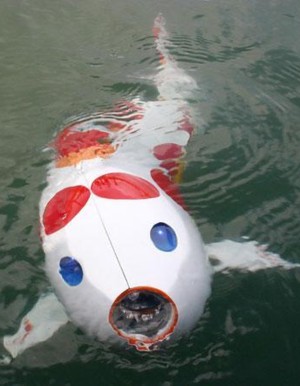 Chatty, a talking mannequin with a human face, is on display at the Tokyo International Anime Fair 2006 (at Tokyo Big Sight through March 26).
Chatty, a talking mannequin with a human face, is on display at the Tokyo International Anime Fair 2006 (at Tokyo Big Sight through March 26).
Developed by Ishikawa Optics & Art Corporation, Chatty has a face that is brought to life by means of a video projector inside its head. A video image of an actual human face (or the face of a computer-generated character, if you prefer) is projected onto the inner surface of the mannequin's face, which serves as a three-dimensional video screen. Audio synced with Chatty's video lip movements gives the face an astonishingly realistic look.
Chatty's presence at the anime fair brings Ishikawa one step closer toward realizing its dream, which is to see the technology behind Chatty's face be put to use in speech-capable historical figures for museum exhibits, theme park guides, or human-faced androids.
[Sources: IT Media, Chatty homepage (check out the video of Chatty reciting Humpty Dumpty in Japanese!)]
UPDATE: Video of Chatty emerges. The Humpty Dumpty mantra continues.

 At a press conference held in Tokyo on March 23, composer Ryuichi Sakamoto made a public appeal to the government to exempt all secondhand electrical goods from the Electrical Appliance and Material Safety Law (a.k.a. PSE Law, or DENAN). The law, which is set to take effect April 1, will prohibit businesses from selling electrical goods that do not bear the PSE mark (that signifies compliance with the law?s safety standards). In other words, before putting products up for sale, dealers will be forced to file paperwork and perform tests (such as 1,000 volts for one minute) on each and every pre-2002 electrical product in order to obtain a PSE mark. Though the government recently revised the law so that it does not apply to certain "vintage" electric instruments with high scarcity value, Sakamoto called upon the government to expand the exemption to all secondhand electrical goods.
At a press conference held in Tokyo on March 23, composer Ryuichi Sakamoto made a public appeal to the government to exempt all secondhand electrical goods from the Electrical Appliance and Material Safety Law (a.k.a. PSE Law, or DENAN). The law, which is set to take effect April 1, will prohibit businesses from selling electrical goods that do not bear the PSE mark (that signifies compliance with the law?s safety standards). In other words, before putting products up for sale, dealers will be forced to file paperwork and perform tests (such as 1,000 volts for one minute) on each and every pre-2002 electrical product in order to obtain a PSE mark. Though the government recently revised the law so that it does not apply to certain "vintage" electric instruments with high scarcity value, Sakamoto called upon the government to expand the exemption to all secondhand electrical goods.

 Forget about fingerprints and DNA -- the way you smell has been added to the list of biometric data that can be used as personal identification. Police in China are now using body odor data to identify suspects in criminal cases.
Forget about fingerprints and DNA -- the way you smell has been added to the list of biometric data that can be used as personal identification. Police in China are now using body odor data to identify suspects in criminal cases.


